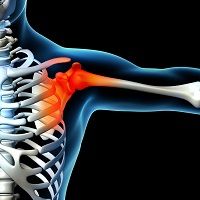Article
Shoulder Injury Happens Earlier Than Expected in Patients with Rheumatoid Arthritis
Author(s):
A study in Arthritis Research & Therapy found that patients with rheumatoid arthritis (RA) experience shoulder pain early in the course of the disease, suggesting that screening of shoulder function should become a larger focus for maintenance and treatment of RA.

A study in Arthritis Research & Therapy found that patients with rheumatoid arthritis (RA) experience shoulder pain early in the course of the disease, suggesting that screening of shoulder function should become a larger focus for maintenance and treatment of RA.
The shoulder is a common site of musculoskeletal pain in the general population, but patients with RA have an additional risk of impaired shoulder function — and therefore, a corresponding increase in the potential for limiting daily activities – because of the inflammation potential in the form of synovitis, bursitis, and tendinitis. Current treatment guidelines consider shoulder joint involvement in RA a later-stage phenomenon, and one that typically impacts older patients. But the reality may be otherwise; part of that perception among rheumatologists may be because shoulder pain is relatively common even in patients without RA. Thus, the current study compared patients with early RA with a gender-matched and age-matched reference group of self-reported healthy individuals.
The controlled cross-sectional study included 103 women with rheumatoid arthritis and a reference group of 103 age-matched healthy women in Sweden. (Men were not included in the study due to greater variability than women in terms of shoulder muscle strength.) The mean age was 47.1 years, the mean disease duration was 20.3 months, and the mean disease activity score of 28 joints (DAS28) was 3.8 among the patients. Participants were provided with self-reported questionnaires quantifying activity limitations. Shoulder function was assessed by isometric strength of the shoulder, shoulder-arm movement and shoulder pain. Hand-grip force was assessed and examination was made of tender and swollen joints among the patients.
Although the healthy controls in the reference group did not have RA, having general shoulder pain was not an exclusion. Patients showed significantly (p < 0.0001) impaired shoulder muscle strength, shoulder-arm movement, and shoulder pain compared to the reference group. Patients shoulder muscle strength was significantly reduced versus the reference group. Activity limitations related to the shoulder-arm-hand (DASH) were significantly (p < 0.0001) higher in the patient group compared to the reference group.
“Shoulder muscle strength in the patient group was approximately 65 % of the strength in the reference group,” the authors noted. “The impaired shoulder muscle strength in the patient group corresponds to previous findings of reduced general muscle strength in patients with longstanding RA. However, our results indicate that shoulder muscle strength is reduced already at an early stage of disease.”
One key finding was the reduction of shoulder muscle strength to 73% in patients reporting no shoulder symptoms compared with healthy subjects reporting no shoulder symptoms. This suggests that patients are not always aware of their functional limitations. “This finding shows the importance of initiating screening of the shoulder function at the time of disease onset in all patients, not just among those reporting shoulder problems,” the team concluded.




